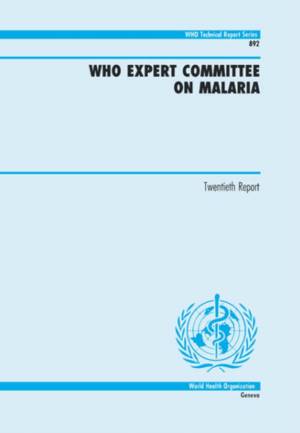
- Retrait gratuit dans votre magasin Club
- 7.000.000 titres dans notre catalogue
- Payer en toute sécurité
- Toujours un magasin près de chez vous
- Retrait gratuit dans votre magasin Club
- 7.000.0000 titres dans notre catalogue
- Payer en toute sécurité
- Toujours un magasin près de chez vous
Description
Reports the recommendations and conclusions of an expert committee convened to assess progress in implementation of the Global Malaria Control Strategy, adopted in 1992. Issued at a time when malaria control is one of the highest priorities at WHO, the report offers expert advice on the full range of questions - from the best measures for ensuring early diagnosis and prompt treatment to strategies for the prevention of drug resistance - that can help countries strengthen programmes for control. The report opens with fact, figures, and maps profiling the current global malaria situation, including trends in the spread and intensification of parasite resistance to antimalarial drugs. Section two considers the extent to which each of four technical elements of the global strategy has been implemented over the past decade. The relationship of malaria control programmes to health sector reforms is explored in the next section, which focuses on the impact of health system decentralization, reforms in health-care financing, and the growth of partnerships with communities and the private sector. Against this background, the components of proper disease management are presented and discussed in terms of their relevance to control programmes. Topics covered include the advantages and disadvantages of diagnosis based on clinical observations, the role of microscopical and other tests for parasite detection, and the factors to consider when deciding on treatment objectives and recommended drugs. The difficult question of drug supply in the absence of formal health services is also considered. Subsequent sections offer advice on techniques for monitoring drug resistance and therapeutic efficacy, strategies for the containment of parasite drug resistance, and methods for the prediction and control of malaria epidemics. A section on the prevention of malaria describes various approaches to vector control, including the use of insecticide-treated bednets and other materials, the management of malaria in development projects, and the current status of drugs used for chemoprophylaxis. The remaining sections discuss information systems and operational research, and describe WHO's new Roll Back Malaria initiative.
Spécifications
Parties prenantes
- Auteur(s) :
- Editeur:
Contenu
- Nombre de pages :
- 84
- Langue:
- Anglais
- Collection :
- Tome:
- n° 892
Caractéristiques
- EAN:
- 9789241208925
- Date de parution :
- 01-01-00
- Format:
- Livre broché
- Format numérique:
- Trade paperback (VS)
- Dimensions :
- 170 mm x 244 mm
- Poids :
- 149 g

Les avis
Nous publions uniquement les avis qui respectent les conditions requises. Consultez nos conditions pour les avis.






